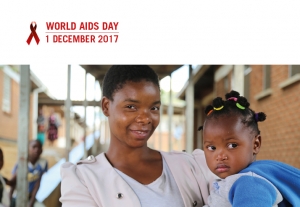Message of the Regional Director for Africa, Dr Matshidiso Moeti, on World AIDS Day 2017
As we mark World AIDS Day on 1 December, whose theme this year is “Right to Health”, I would like to share the story of Alex, a 14 year old high school student who lives with his grandmother in Douala, Cameroon. He was diagnosed with HIV in 2016, a year after his mother died of tuberculosis. “My family gave me support, love and care and the doctors gave me medicines. The medicine will make me live a normal life and strengthen my body. I love going to school and studying and I hope to become a doctor one day so that I can look after other HIV positive people.”
Just like Alex, all people have the right to health no matter their age, sex and where they are born. Commemorating World AIDS Day underscores that everybody counts in striving to achieve more rapid and sustainable progress towards universal health coverage for all people living with HIV.
There is hope of ending AIDS in the African Region by 2030. Due to the rapid scale-up of HIV treatment and existing HIV prevention interventions, AIDS-related deaths in the Region have dropped by more than half, from over than 1.5 million in 2005 to about 720 000 in 2016. For the first time, more than half of all people living with HIV in Africa have access to life-saving HIV treatment, which reached almost 14 million people by the end of 2016. This puts the Region on track to achieving the target of 23 million people on treatment by 2020.
This is significant progress, but the right to health for all is not being realized. Young people, especially young women, continue to be at great risk of HIV infection. Children are often missed out, key populations such as sex workers, men who have sex with men and injecting drug users are not being reached, and men are also left behind. Countries in the West and Central African sub-regions still lag behind the rest of the continent. WHO and its partners are working with these member states to implement catch-up plans to accelerate HIV treatment.
In the African Region, nearly 1.2 million people contracted HIV in 2016. An estimated 6 million people living with HIV still do not know their status. Almost 12 million people living with HIV do not have access to antiretroviral therapy, and more than half of all people on HIV treatment still have detectable levels of the virus. This reinforces the urgent need for HIV prevention and treatment services for all who need them.
As we move towards ending AIDS by 2030, we urge all Member States to put the health and human rights of people living with HIV at the center of the response, to ensure that we reach all communities that are being left behind.
More investment is needed in the health and education of adolescents and young women to increase their access to services and reduce their vulnerability to HIV infection. WHO recommends that countries initiate new approaches such as self-testing to reach more people, and accelerate effective prevention interventions such as condom use.
Furthermore, making newer and safer medicines routinely available, reorienting service delivery to target specific populations and strengthening information systems will boost progress towards the targets. I appeal to all communities to embrace the innovations that will accelerate momentum towards an AIDS-free generation.
All individuals have a right to health. WHO will continue to support Member States to scale up HIV services to give everyone the right to health and make sure we leave no one behind.



